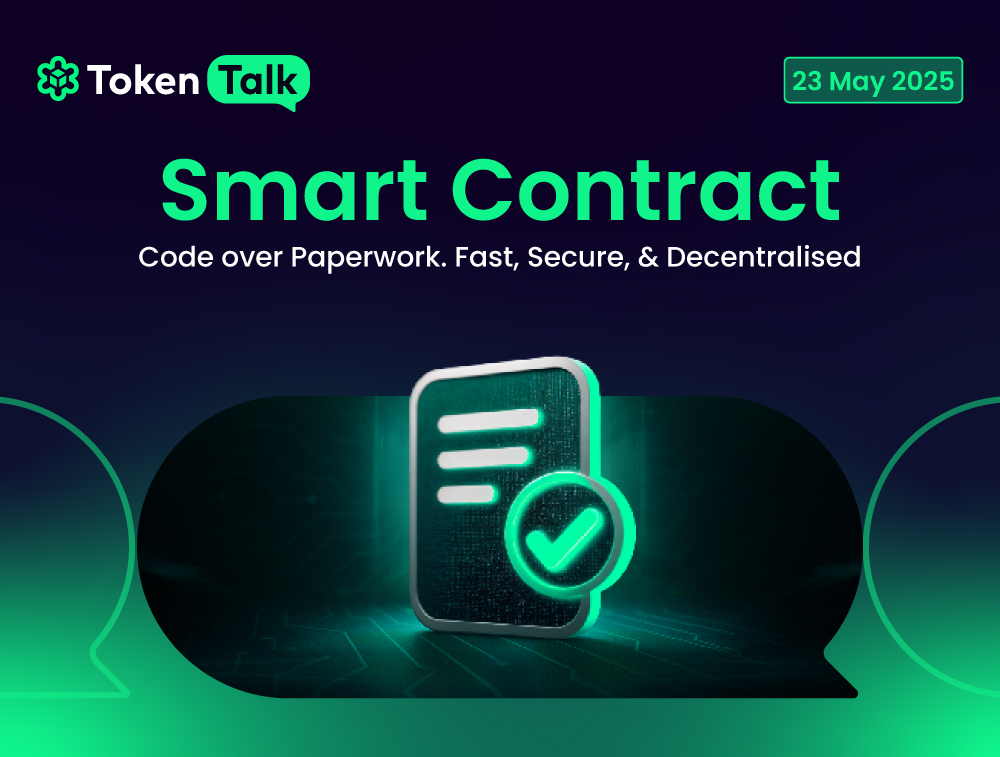Share this
Behind the Code: How Smart Contracts Are Reshaping Finance and Ownership

Before diving into the world of smart contracts, it’s important to understand what they are, how they work, and why they matter in today’s digital economy. From powering DeFi and NFTs to enabling trustless agreements, smart contracts are one of the most transformative technologies in blockchain.
In this guide, we explore what smart contracts are, how they function, where they’re used, and why they’re essential for investors, developers, and everyday users alike.
What Is a Smart Contract?
A smart contract is a self-executing digital agreement encoded on a blockchain. It carries out a set of predefined conditions automatically—without the need for intermediaries.
For example, imagine a real estate transaction. Instead of relying on brokers or banks, a smart contract can automatically execute the deal once all conditions are met—transferring ownership and funds securely on-chain.
How Smart Contracts Work
Smart contracts are created based on the terms of an agreement and deployed on blockchains that support programmable logic, like Ethereum. Once written, these contracts automatically execute when specified conditions are met.
Because they are distributed across the network, no single party can tamper with them. Any changes would require simultaneous updates across all nodes, making them highly secure and resistant to manipulation.
Operating on the Blockchain
Smart contracts are appealing because of their transparency, verifiability, and precision. These qualities have inspired innovations like DeFi (Decentralized Finance), NFTs (Non-Fungible Tokens), and GameFi. Smart contracts form the foundation for these technologies, enabling new digital services and attracting more users to the decentralized world.
Here’s a typical flow in a smart contract’s lifecycle:
- Coding the Contract
The terms of the agreement are written in code using blockchain-supported programming languages. - Deploying the Contract
Once finalized, the contract is uploaded to the blockchain. From this point, it becomes immutable. - Execution
When the contract’s conditions are met, it executes automatically—no third party required. - Verification and Validation
The blockchain network collectively verifies the transaction, ensuring accuracy and transparency.
How Conditions and Automation Work
Smart contracts work based on coded commands and specified conditions. These can typically be broken down into:
- Agreement Encoding: The contract terms are written in code and stored on the blockchain.
- Triggering Events: Conditions like payment completion or delivery confirmation activate the contract.
- Termination: If conditions aren’t met, the contract may cancel itself or return funds automatically.
Popular Smart Contract Programming Languages
- Solidity – Introduced in 2014, this high-level, object-oriented language is the most widely used for Ethereum-based smart contracts.
- Vyper – A Python-based language for Ethereum with a focus on simplicity and security. It lacks some complex functions but is easier to audit.
- DAML (Digital Asset Modeling Language) – An open-source, user-friendly language with strong security and built-in tools.
- JavaScript – Commonly used in Web 3.0 development, especially for integrating decentralized features to web apps.
Why Smart Contracts Matter
Smart contracts are a core building block of decentralized systems. They support automation, reduce friction, and open up new ways to build trust online. Here’s what makes them valuable:
- Automated execution with no middlemen
- Increased accuracy and reduced human error
- Improved transparency and security
- Lower operational costs
- Programmable flexibility for digital services
Real-World Use Cases of Smart Contracts
Smart contracts go far beyond simple payments. They power some of the most innovative applications in blockchain today, including:
- DeFi (Decentralized Finance) – Enables transparent financial services like loans, trading, and dApps without intermediaries.
- NFT Creation & Trading – Facilitates the minting and exchange of NFTs with speed and ease.
- Automated Insurance – Smart contracts can trigger claims or payouts automatically based on predefined conditions.
- Supply Chain Management – Enhances supply chain systems by automating processes and ensuring efficiency and traceability.
Risks and Limitations
Despite the benefits, smart contracts come with some important caveats:
- Bugs and vulnerabilities in the code can’t be easily fixed once deployed
- Insecure or poorly written contracts can lead to financial loss
- Thorough testing and audits are essential before launch
Leading Platforms That Support Smart Contracts
The most well-known platform is Ethereum, which allows developers to build a wide range of decentralized applications. Other Layer 1 networks like Avalanche, Solana, and Binance Smart Chain also support smart contracts, offering different benefits in terms of speed, fees, and scalability.
Smart contracts are used across:
- Decentralized trading platforms
- Blockchain-based voting systems
- Digital wills and inheritance
- Financial services and token exchanges
The Future of Smart Contracts
As blockchain adoption continues to grow, smart contracts are becoming the foundation of Web3—from finance and entertainment to supply chains and legal agreements.
Their ability to enforce trustless interactions makes them essential to the next phase of digital infrastructure. For investors, understanding how smart contracts work is key to evaluating crypto projects, platforms, and potential risks.
Whether you’re trading tokens or building dApps, smart contracts are the invisible force powering many of the innovations in crypto today—and they’re here to stay.
Remark: The views, information, knowledge, and opinions expressed herein are those of the individuals involved and do not represent the views of Bitazza or its employees. Neither this email nor the content presented constitutes investment advice.
Share this
- January 2026 (3)
- December 2025 (13)
- November 2025 (6)
- October 2025 (10)
- September 2025 (8)
- August 2025 (17)
- July 2025 (29)
- June 2025 (13)
- May 2025 (14)
- April 2025 (12)
- March 2025 (8)
- February 2025 (8)
- January 2025 (8)
- December 2024 (7)
- November 2024 (5)
- October 2024 (14)
- September 2024 (9)
- August 2024 (14)
- July 2024 (3)
- June 2024 (48)
No Comments Yet
Let us know what you think